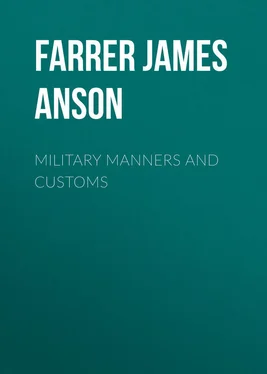James Farrer - Military Manners and Customs
Здесь есть возможность читать онлайн «James Farrer - Military Manners and Customs» — ознакомительный отрывок электронной книги совершенно бесплатно, а после прочтения отрывка купить полную версию. В некоторых случаях можно слушать аудио, скачать через торрент в формате fb2 и присутствует краткое содержание. Жанр: foreign_antique, foreign_prose, на английском языке. Описание произведения, (предисловие) а так же отзывы посетителей доступны на портале библиотеки ЛибКат.
- Название:Military Manners and Customs
- Автор:
- Жанр:
- Год:неизвестен
- ISBN:нет данных
- Рейтинг книги:5 / 5. Голосов: 1
-
Избранное:Добавить в избранное
- Отзывы:
-
Ваша оценка:
- 100
- 1
- 2
- 3
- 4
- 5
Military Manners and Customs: краткое содержание, описание и аннотация
Предлагаем к чтению аннотацию, описание, краткое содержание или предисловие (зависит от того, что написал сам автор книги «Military Manners and Customs»). Если вы не нашли необходимую информацию о книге — напишите в комментариях, мы постараемся отыскать её.
Military Manners and Customs — читать онлайн ознакомительный отрывок
Ниже представлен текст книги, разбитый по страницам. Система сохранения места последней прочитанной страницы, позволяет с удобством читать онлайн бесплатно книгу «Military Manners and Customs», без необходимости каждый раз заново искать на чём Вы остановились. Поставьте закладку, и сможете в любой момент перейти на страницу, на которой закончили чтение.
Интервал:
Закладка:
The first striking difference between military and naval warfare is that, while – in theory, at least – the military forces of a country confine their attacks to the persons and power of their enemy, the naval forces devote themselves primarily to the plunder of his property and commerce. If on land the theory of modern war exempts from spoliation all of an enemy’s goods that do not contribute to his military strength, on sea such spoliation is the professed object of maritime warfare. And the difference, we are told, is ‘the necessary consequence of the state of war, which places the citizens or subject of the belligerent states in hostility to each other, and prohibits all intercourse between them,’ 64 64 Halleck, International Law , ii. 154.
although the very reason for the immunity of private property on land is that war is a condition of hostility between the military forces of two countries, and not between their respective inhabitants.
Writers on public law have invented many ingenious theories to explain and justify, on rational grounds, so fundamental a difference between the two kinds of warfare. ‘To make prize of a merchant ship,’ says Dr. Whewell, ‘is an obvious way of showing (such a ship) that its own State is unable to protect it at sea, and thus is a mode of attacking the State;’ 65 65 Elements of Morality , sec. 1068.
a reason that would equally justify the slaughter of nonagenarians. According to Hautefeuille, the differences flows naturally from the conditions of hostilities waged on different elements, and especially from the absence at sea of any fear of a rising en masse which, as it may be the result of wholesale robbery on land, serves to some extent as a safeguard against it. 66 66 Des Droits et Devoirs des Nations neutres , ii. 321-323.
A simpler explanation may trace the difference to the maritime Piracy which for many centuries was the normal relation between the English and Continental coasts, and out of which the navies of Europe were gradually evolved. Sir H. Nicolas, describing the naval state of the thirteenth and early part of the fourteenth century, proves by abundant facts the following picture of it: ‘During a truce or peace ships were boarded, plundered, and captured by vessels of a friendly Power as if there had been actual war. Even English merchant ships were attacked and robbed as well in port as at sea by English vessels, and especially by those of the Cinque Ports, which seem to have been nests of robbers; and, judging from the numerous complaints, it would appear that a general system of piracy existed which no government was strong enough to restrain.’ 67 67 History of the Royal Navy , i. 357.
The governments of those days were, however, not only not strong enough to restrain, but, as a rule, only too glad to make use of these pirates as auxiliaries in their wars with foreign Powers. Some English ships carrying troops to France having been dispersed by a storm, the sailors of the Cinque Ports were ordered by Henry III., in revenge, to commit every possible injury on the French; a commission undertaken with such zeal on their part that they slew and plundered not only all the foreigners they could catch, but their own countrymen returning from their pilgrimages (1242). During the whole reign of Henry IV. (1399-1413), though there existed a truce between France and England, the ordinary incidents of hostilities continued at sea just as if the countries had been at open war. 68 68 Nicolas, ii. 341.
The object on either side was plunder and wanton devastation; nor from their landing on each other’s coasts, burning each other’s towns and crops, and carrying off each other’s property, did the country of either derive the least benefit whatever. The monk of St. Denys shows that these pirates were really the mariners on whom the naval service of England chiefly depended in time of war, for he says, in speaking of this period: ‘The English pirates, discontented with the truce and unwilling to abandon their profitable pursuits, determined to infest the sea and attack merchant ships. Three thousand of the most skilful sailors of England and Bayonne had confederated for that purpose, and, as was supposed, with the approbation of their king.’ It was not till the year 1413 that Henry V. sought to put a stop to the piratical practices of the English marine, and he then did so without requiring a reciprocal endeavour on the part of the other countries of Europe. 69 69 Nicolas, ii. 405.
Maritime warfare being thus simply an extension of maritime piracy, the usages of the one naturally became the usages of the other; the only difference being that in time of war it was with the licence and pay of the State, and with the help of knights and squires, that the pirates carried on their accustomed programme of incendiarism, massacres, and robberies.
Конец ознакомительного фрагмента.
Текст предоставлен ООО «ЛитРес».
Прочитайте эту книгу целиком, купив полную легальную версию на ЛитРес.
Безопасно оплатить книгу можно банковской картой Visa, MasterCard, Maestro, со счета мобильного телефона, с платежного терминала, в салоне МТС или Связной, через PayPal, WebMoney, Яндекс.Деньги, QIWI Кошелек, бонусными картами или другим удобным Вам способом.
1
Halleck’s International Law , ii. 21. Yet within three weeks of the beginning of the war with France 60,000 Prussians were hors de combat .
2
‘Artem illam mortiferam et Deo odibilem balistrariorum et sagittariorum adversus Christianos et Catholicos exerceri de cætero sub anathemate prohibemus.’
3
Fauchet’s Origines des Chevaliers, &c. &c., ii. 56; Grose’s Military Antiquities, i. 142; and Demmin’s Encyclopédie d’Armurerie, 57, 496.
4
Fauchet, ii. 57. ‘Lequel engin, pour le mal qu’il faisait (pire que le venin des serpens), fut nommé serpentine,’ &c.
5
Grose, ii. 331.
6
Dyer, Modern Europe , iii. 158.
7
Scoffern’s Projectile Weapons , &c., 66.
8
Sur l’Esprit, i. 562.
9
Reade, Ashantee Campaign, 52.
10
Livy, xliv. 42.
11
These Instructions are published in Halleck’s International Law , ii. 36-51; and at the end of Edwards’s Germans in France .
12
‘It would have been desirable,’ said the Russian Government, ‘that the voice of a great nation like England should have been heard at an inquiry of which the object would appear to have met with its sympathies.’
13
Jus Gentium, art. 887, 878.
14
Florus, ii. 20.
15
Edwards’s Germans in France , 164.
16
This remarkable fact is certified by Mr. Russell, in his Diary in the last Great War , 398, 399.
17
Cicero, In Verrem , iv. 54.
18
Интервал:
Закладка:
Похожие книги на «Military Manners and Customs»
Представляем Вашему вниманию похожие книги на «Military Manners and Customs» списком для выбора. Мы отобрали схожую по названию и смыслу литературу в надежде предоставить читателям больше вариантов отыскать новые, интересные, ещё непрочитанные произведения.
Обсуждение, отзывы о книге «Military Manners and Customs» и просто собственные мнения читателей. Оставьте ваши комментарии, напишите, что Вы думаете о произведении, его смысле или главных героях. Укажите что конкретно понравилось, а что нет, и почему Вы так считаете.












